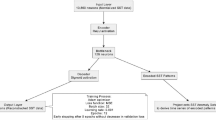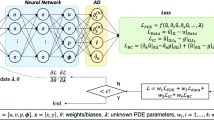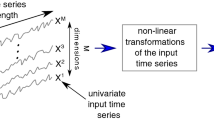Abstract
Dynamic mode decomposition (DMD) and deep learning are data-driven approaches that allow a description of the target phenomena in new representation spaces. This fact motivates their comparison in the analysis of flow data, generated through experimental setups and numerical simulations. The focused application is the processing of high-speed videos of horizontal two-phase stratified and slug flows regimes. Henceforth, in this work, we consider the traditional DMD, the sparsity-promoting DMD (SPDMD) and, in the deep learning context, we select an unsupervised convolutional autoencoder (CAE). In this avenue, it becomes imperative to compare DMD and deep learning with respect to: computational complexity of target techniques; reduced order modeling versus data representation; data set necessary to compute the dynamic modes and deep learning training; the preservation of the phase interface in the DMD and CAE space; data synthesis. In general, the results favor DMD in the considered applications.




















Similar content being viewed by others
References
Alkinani, H., Al-Hameedi, A.T., Dunn-Norman, S., Flori, R., Alsaba, M., Amer, A.: Applications of artificial neural networks in the petroleum industry: a review. In: SPE Middle East Oil and Gas Show and Conference (2019)
Andrianov, N.: A machine learning approach for virtual flow metering and forecasting (2018). arXiv:1802.05698
Ansell, P., Balajewicz, M.: Separation of unsteady scales in a mixing layer using empirical mode decomposition. AIAA J. 55(2), 419–434 (2017)
Bai, Z., Kaiser, E., Proctor, J.L., Kutz, J.N., Brunton, S.L.: Dynamic mode decomposition for compressive system identification (2017). arXiv:1710.07737
Bao, A., Gildin, E.: Data-driven model reduction based on sparsity-promoting methods for multiphase flow in porous media. In: SPE Latin Am. and Caribbean Petroleum Eng. Conf. (2017). https://doi.org/10.2118/185514-MS
Bhagwat, S.M., Ghajar, A.J.: Flow patterns, void fraction and pressure drop in gas-liquid two-phase flow at different pipe orientations. In: Cheng, L. (ed.) Frontiers and Progress in Multiphase Flow, vol. I, ch. 4. (2011)
Burlutskii, E., Felice, R.D.: Experimental and numerical study of two-phase flow mixing in gas-liquid external-loop airlift reactor. Int. J. Multiph. Flow 119, 1–13 (2019)
Chollet, F.: Deep Learning with Python, 1st edn. Manning Publications Co., Greenwich (2017)
Dibek, B., Demir, H.: Determination of void fraction by image processing. Uludag Univ. J. Fac. Eng. 22, 97–114 (2017)
Du, M., Yin, H., Chen, X., Wang, X.: Oil-in-water two-phase flow pattern identification from experimental snapshots using convolutional neural network. IEEE Access 7, 6219–6225 (2019)
Erichson, N.B., Brunton, S.L., Kutz, J.N.: Randomized dynamic mode decomposition. CoRR abs/1702.02912 (2017)
Faccini, J.L.H., Sampaio, P.A.B.D., Jian, S.: Assessment of intermittent two-phase flow using a high-speed visualization technique. In: International Nuclear Atlantic Conference (INAC) (2007)
Garcia-Garcia, A., Orts-Escolano, S., Oprea, S., Villena-Martinez, V., Martinez-Gonzalez, P., Garcia-Rodriguez, J.: A survey on deep learning techniques for image and video semantic segmentation. Appl. Soft Comput. 70, 41–65 (2018)
Ghommem, M., Gildin, E., Ghasemi, M.: Complexity reduction of multiphase flows in heterogeneous porous media. SPE J. 21, 1–8 (2015)
Goodfellow, I., Bengio, Y., Courville, A.: Deep Learning. MIT Press, Cambridge (2016)
Hann, D.B., Loizou, K., Vasques, J., Tokarev, M.P., Cherdantsev, A.V.: The use of pod filtering to study the transition from 2d to 3d in stratified twophase flow. In: Proc. of the Int. Symp. on the App. of Laser and Imaging Tech. to Fluid Mechanics (2018)
Henderson, A., Ahrens, J.: The Paraview Guide: A Parallel Visualization Application. Kitware Inc, New York (2004)
Jovanović, M.R., Schmid, P.J., Nichols, J.W.: Sparsity-Promoting Dynamic Mode Decomposition Code (2013). http://people.ece.umn.edu/users/mihailo/software/dmdsp/. Accessed Mar 2019
Jovanović, M.R., Schmid, P.J., Nichols, J.W.: Sparsity-promoting dynamic mode decomposition. Phys. Fluids 26(2), 024103 (2014). (22 pages)
Kanin, E., Osiptsov, A., Vainshtein, A., Burnaev, E.: A predictive model for steady-state multiphase pipe flow: machine learning on lab data. J. Pet. Sci. Eng. 180, 727–746 (2019)
Klus, S., Gelß, P., Peitz, S., Schütte, C.: Tensor-based dynamic mode decomposition. Nonlinearity 31(7), 3359–3380 (2018)
Kong, R., Rau, A., Kim, S., Bajorek, S., Tien, K., Hoxie, C.: A robust image analysis technique for the study of horizontal air-water plug flow. Exp. Thermal Fluid Sci. 102, 245–260 (2019). https://doi.org/10.1016/j.expthermflusci.2018.12.001
Kutz, J.N., Brunton, S.L., Brunton, B.W., Proctor, J.L.: Dynamic Mode Decomposition: Data-Driven Modeling of Complex Systems. SIAM-Society for Industrial and Applied Mathematics, Philadelphia (2016)
Lecun, Y., Bengio, Y., Hinton, G.: Deep learning. Nature 521(7553), 436–444 (2015)
Lin, D., Grimson, E., Fisher, J.: Learning visual flows: a lie algebraic approach. In: 2009 IEEE Conference on Computer Vision and Pattern Recognition, pp. 747–754 (2009)
Liu, M., Tan, L., Cao, S.: Dynamic mode decomposition of gas-liquid flow in a rotodynamic multiphase pump. Renew. Energy 139, 1159–1175 (2019)
Lu, K., Jin, Y., Chen, Y., Yang, Y., Hou, L., Zhang, Z., Li, Z., Fu, C.: Review for order reduction based on proper orthogonal decomposition and outlooks of applications in mechanical systems. Mech. Syst. Sig. Process. 123, 264–297 (2019)
Miyanawala, T.P., Jaiman, R.K.: An efficient deep learning technique for the Navier-Stokes equations: application to unsteady wake flow dynamics (2017)
Mo, S., Zhu, Y., Zabaras, N., Shi, X., Wu, J.: Deep convolutional encoder-decoder networks for uncertainty quantification of dynamic multiphase flow in heterogeneous media. ArXiv (2019)
Nazemi, E.: Application of Neural Network in Radiation-Based Multiphase Flow Meter. LAP LAMBERT Acad, Pub, London (2015)
Noack, B.R., Eckelmann, H.: A low-dimensional Galerkin method for the three-dimensional flow around a circular cylinder. Phys. Fluids 6, 124–143 (1994)
Nogueira, S., Riethmuler, M., Campos, J., Pinto, A.: Flow in the nose region and annular film around a Taylor bubble rising through vertical columns of stagnant and flowing Newtonian liquids. Chem. Eng. Sci. 61(2), 845–857 (2006)
Ramos, E.M., Giraldi, G.A., Darze, G.M., Faccini, J.L.H.: Dynamic mode decomposition for analyzing two-phase flows video data. In: Proc. of the 10th International Conference on Multiphase Flow (ICMF), pp. 1–10. Rio de Janeiro, Brazil (2019)
Rysak, A., Litak, G., Mosdorf, R., Górski, G.: Investigation of two-phase flow patterns by analysis of eulerian space-time correlations. Int. J. Multiph. Flow 85(C), 23–37 (2016). https://doi.org/10.1016/j.ijmultiphaseflow.2016.04.017
Sainburg, T., Thielk, M., Theilman, B., Migliori, B., Gentner, T.: Generative adversarial interpolative autoencoding: adversarial training on latent space interpolations encourage convex latent distributions. arXiv (2018)
Schäfer, J., Schmitt, P., Hlawitschka, M.W., Bart, H.J.: Measuring particle size distributions in multiphase flows using a convolutional neural network. Chemie Ingenieur Technik 91(11), 1688–1695 (2019)
Schmid, P.: Dynamic mode decomposition of numerical and experimental data. J. Fluid Mech. 656, 5–28 (2010)
Selesnick, I.W., Parekh, A., Bayram, I.: Convex 1-d total variation denoising with non-convex regularization. IEEE Sig. Process. Lett. 22, 141–144 (2015)
Shi, X., Tan, C., Dong, F., Murai, Y.: Oil-gas-water three-phase flow characterization and velocity measurement based on time-frequency decomposition. Int. J. Multiph. Flow 111, 219–231 (2019)
Taitel, Y., Dukler, A.E.: A model for predicting flow regime transitions in horizontai and near horizontal gas-liquid flow. AlChE J. 22, 47–55 (1976)
Takeishi, N., Kawahara, Y., Yairi, T.: Learning koopman invariant subspaces for dynamic mode decomposition. In: Proceedings of the 31st International Conference on Neural Information Processing Systems, NIPS’17, pp. 1130–1140 (2017)
Tissot, G., Cordier, L., Benard, N., Noack, B.R.: Model reduction using dynamic mode decomposition. Comptes Rendus Mécanique 342(6), 410–416 (2014)
Vahabi, N.: Machine learning algorithms for analysis of oil, gas and water well acoustic datasets. Ph.D. thesis, University College London, discovery.ucl.ac.uk/id/eprint/10073692/ (2019)
Wang, H., Raj, B., Xing, E.P.: On the origin of deep learning (2017). arXiv:1702.07800
Wang, Y., Lin, G.: Efficient deep learning techniques for multiphase flow simulation in heterogeneous porousc media. J. Comput. Phys. 401, 108968 (2019)
Wang, Z.B., Chen, R., Wang, H., Liao, Q., Zhu, X., Li, S.Z.: An overview of smoothed particle hydrodynamics for simulating multiphase flow. Appl. Math. Model. 40(23), 9625–9655 (2016)
Williams, M., Kevrekidis, I., Rowley, C.: A data-driven approximation of the Koopman operator: extending dynamic mode decomposition. J. Nonlinear Sci. 25(6), 1307–1346 (2015)
Xavier, G., Bengio, Y.: Understanding the difficulty of training deep feedforward neural networks. In: Proceedings of Aistats, pp. 249–256 (2010)
Zhang, Q., Liu, Y., Wang, S.: The identification of coherent structures using proper orthogonal decomposition and dynamic mode decomposition. J. Fluids Struct. 49, 53–72 (2014)
Ziegenhein, T., Lucas, D.: On sampling bias in multiphase flows: particle image velocimetry in bubbly flows. Flow Meas. Instrum. 48, 36–41 (2016)
Acknowledgements
This work was funded by CAPES (Grant 88882.332644/2019 - 01 and Grant 88887.464658/2019 - 00).
Author information
Authors and Affiliations
Corresponding author
Ethics declarations
Conflict of interest
The authors declare that they have no conflict of interest.
Rights and permissions
About this article
Cite this article
Ramos, E.M., Darze, G.M., do Nascimento, F.R.T. et al. Comparison of Dynamic Mode Decomposition and Deep Learning Techniques for Two-Phase Flows Analysis. Flow Turbulence Combust 105, 1345–1379 (2020). https://doi.org/10.1007/s10494-020-00151-z
Received:
Accepted:
Published:
Issue Date:
DOI: https://doi.org/10.1007/s10494-020-00151-z




